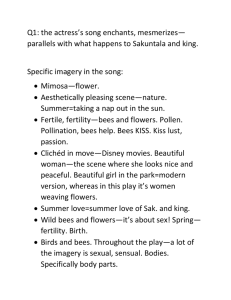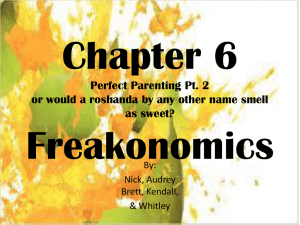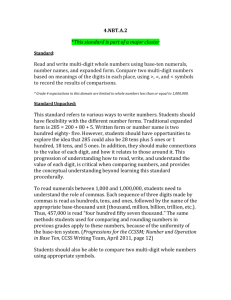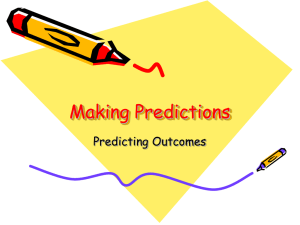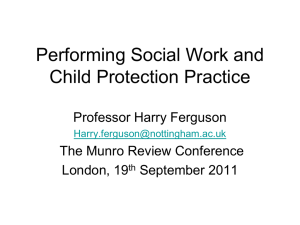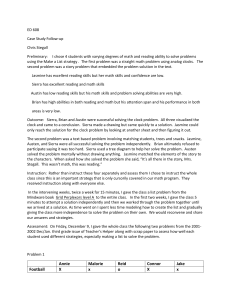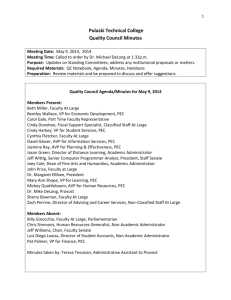Assignment 2 Model Answer
advertisement
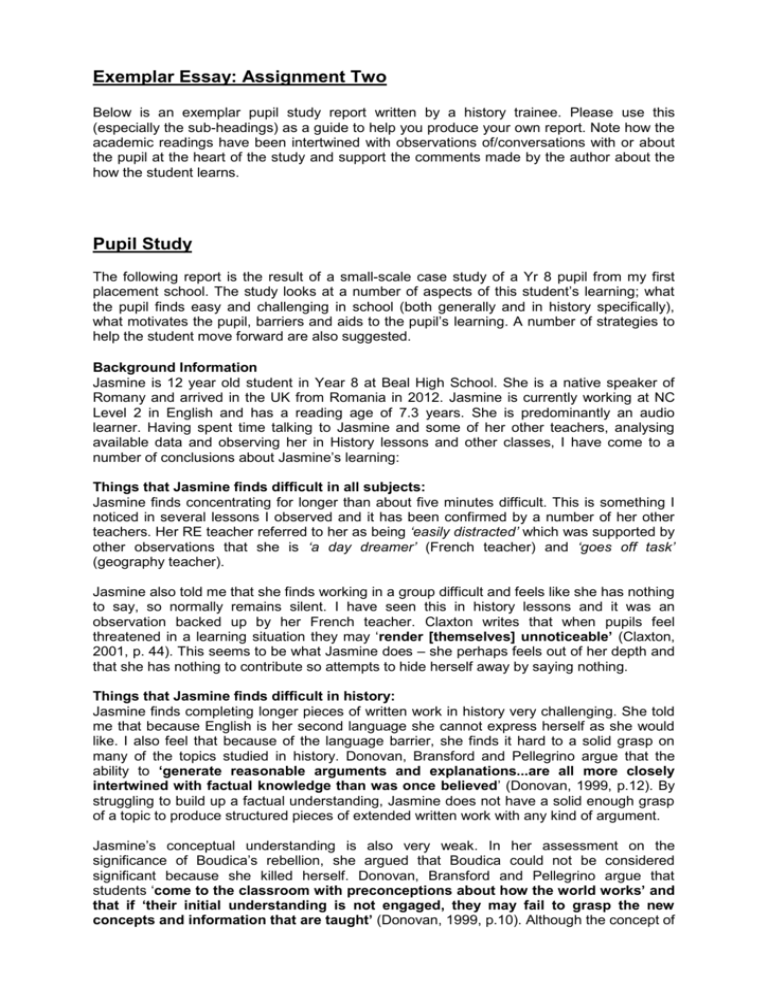
Exemplar Essay: Assignment Two Below is an exemplar pupil study report written by a history trainee. Please use this (especially the sub-headings) as a guide to help you produce your own report. Note how the academic readings have been intertwined with observations of/conversations with or about the pupil at the heart of the study and support the comments made by the author about the how the student learns. Pupil Study The following report is the result of a small-scale case study of a Yr 8 pupil from my first placement school. The study looks at a number of aspects of this student’s learning; what the pupil finds easy and challenging in school (both generally and in history specifically), what motivates the pupil, barriers and aids to the pupil’s learning. A number of strategies to help the student move forward are also suggested. Background Information Jasmine is 12 year old student in Year 8 at Beal High School. She is a native speaker of Romany and arrived in the UK from Romania in 2012. Jasmine is currently working at NC Level 2 in English and has a reading age of 7.3 years. She is predominantly an audio learner. Having spent time talking to Jasmine and some of her other teachers, analysing available data and observing her in History lessons and other classes, I have come to a number of conclusions about Jasmine’s learning: Things that Jasmine finds difficult in all subjects: Jasmine finds concentrating for longer than about five minutes difficult. This is something I noticed in several lessons I observed and it has been confirmed by a number of her other teachers. Her RE teacher referred to her as being ‘easily distracted’ which was supported by other observations that she is ‘a day dreamer’ (French teacher) and ‘goes off task’ (geography teacher). Jasmine also told me that she finds working in a group difficult and feels like she has nothing to say, so normally remains silent. I have seen this in history lessons and it was an observation backed up by her French teacher. Claxton writes that when pupils feel threatened in a learning situation they may ‘render [themselves] unnoticeable’ (Claxton, 2001, p. 44). This seems to be what Jasmine does – she perhaps feels out of her depth and that she has nothing to contribute so attempts to hide herself away by saying nothing. Things that Jasmine finds difficult in history: Jasmine finds completing longer pieces of written work in history very challenging. She told me that because English is her second language she cannot express herself as she would like. I also feel that because of the language barrier, she finds it hard to a solid grasp on many of the topics studied in history. Donovan, Bransford and Pellegrino argue that the ability to ‘generate reasonable arguments and explanations...are all more closely intertwined with factual knowledge than was once believed’ (Donovan, 1999, p.12). By struggling to build up a factual understanding, Jasmine does not have a solid enough grasp of a topic to produce structured pieces of extended written work with any kind of argument. Jasmine’s conceptual understanding is also very weak. In her assessment on the significance of Boudica’s rebellion, she argued that Boudica could not be considered significant because she killed herself. Donovan, Bransford and Pellegrino argue that students ‘come to the classroom with preconceptions about how the world works’ and that if ‘their initial understanding is not engaged, they may fail to grasp the new concepts and information that are taught’ (Donovan, 1999, p.10). Although the concept of significance had been discussed quite extensively in class, Jasmine’s pre-existing understanding of the term ‘significance’ was clearly not drawn out and challenged and so she reverted to using it when completing her assignment. As such she deemed Boudica insignificant as she had killed herself because this clearly did not meet Jasmine’s personal criteria for significance. Things that Jasmine finds easy: When explained clearly Jasmine understands substantive terms well. Jasmine also told me that she finds creating mind maps in all subjects quite easy. Here she is free to write key words and not sentences and can simply focus on what she definitely knows. She has covered most of the Yr 8 work already (when in Romania) and so feels confident with the subject matter. Motivation to Learn: Jasmine says that when she feels she is good at a subject and she thinks it is important and relevant then she is she is motivated to learn. This very much fits in with the work of John Keller and his claims in his ARCS model for the motivational design of learning that amongst other things, ‘establishing [the] relevance’ of a topic can ‘increase pupil motivation’ to learn (Keller in Williams, 2008, p. 27). Jasmine cited Maths as an example of a subject that she thinks is important and relevant and that she is good at. It is indeed in Maths where Jasmine is currently performing (in terms of NC levels) best: her current level in Maths is a high Level 3, the best of all her subjects. Strategies which aid Jasmine’s learning: Although Jasmine is a predominantly an audio learner, she told me that when she sees and hears things at the same time she can understand much better. This was certainly evident in history; when we watched a video of the Battle of Hastings she volunteered three correct answers to questions centred on the video which is far better than normal. With extra support from TAs or LSAs Jasmine also feels that she does better. Equally Jasmine said that when she attends homework club and gets one-to-one support and supervision it really helps her. Barriers to Learning: Perhaps the key thing preventing Jasmine from learning at the moment is her low level of English. She is currently working at Level 2 in English and her Yr 7 verbal reasoning CAT score was 80- very low. Jasmine’s limited vocabulary means that she is sometimes unable to access information in class and unless a task is specifically re-stated and re-explained to her on an individual level, she often is unsure about how to go about completing an activity. Equally however, I also feel that Jasmine is also being prevented from learning because she lacks resilience. She gives up very easily and does not really push herself. As Dweck writes this could suggest that Jasmine sees ‘ability as a fixed commodity’ and when something is difficult that she has ‘hit the ceiling of [her] ability’ (Dweck in Claxton, 1999, p.35). As such she doesn’t push herself any further as she feels that she cannot do any more. Concerns about Jasmine’s organisational ability have also been raised by the school. In history and other subjects such as RE she certainly does not always do her homework. This is often work that re-enforces what was done in lessons and so Jasmine misses the opportunity to consolidate her learning. Suggestions to help Jasmine become a better learner: Jasmine needs support with key terms used in each lesson. This could be done either through class discussion of key vocabulary or by giving Jasmine (and potentially others) a differentiated support sheet as appropriate. As suggested by the DfES using “visual clues” to make the meaning of key words clear may also be helpful (Department for Education and Skills, 2002). Jasmine also needs her confidence building up. When I asked Jasmine what she was good at, she originally said ‘nothing’, but when pushed offered Maths as a suggestion. As John Keller argues confidence is a crucial factor in motivation for learning and pupils need to feel that ‘they can achieve some degree of success’ (Keller in Williams, 2008, p. 27). I think if she felt more confident Jasmine really would be more motivated to learn and in turn may also gain more resilience, more willingness to work in groups and more motivation to do her homework. I think that seating Jasmine next to a higher attaining pupil may be useful. I think she would benefit from sitting next to someone who knows what they are doing. Reference List Books: Claxton, G. (1999), Wise Up: The Challenge of Life Long Learning, Bloomsbury Publishing. Claxton G. (2001), Wise Up: Learning to Live the Learning Life, Network Educational Press. Donovan, M. S., Bransford, J. D., Pellegrino, J. W., (eds.) (1999), How People Learn Bridging Research and Practice, National Academies Press. Government Publications: Department for Education and Skills (DfES) (2002), National Strategy: Access and engagement in history: Teaching pupils for whom English is an additional language, DfES. Other: Williams, J. (2008), TES Essential Guide: Great minds: Education’s most influential philosophers, TES.

